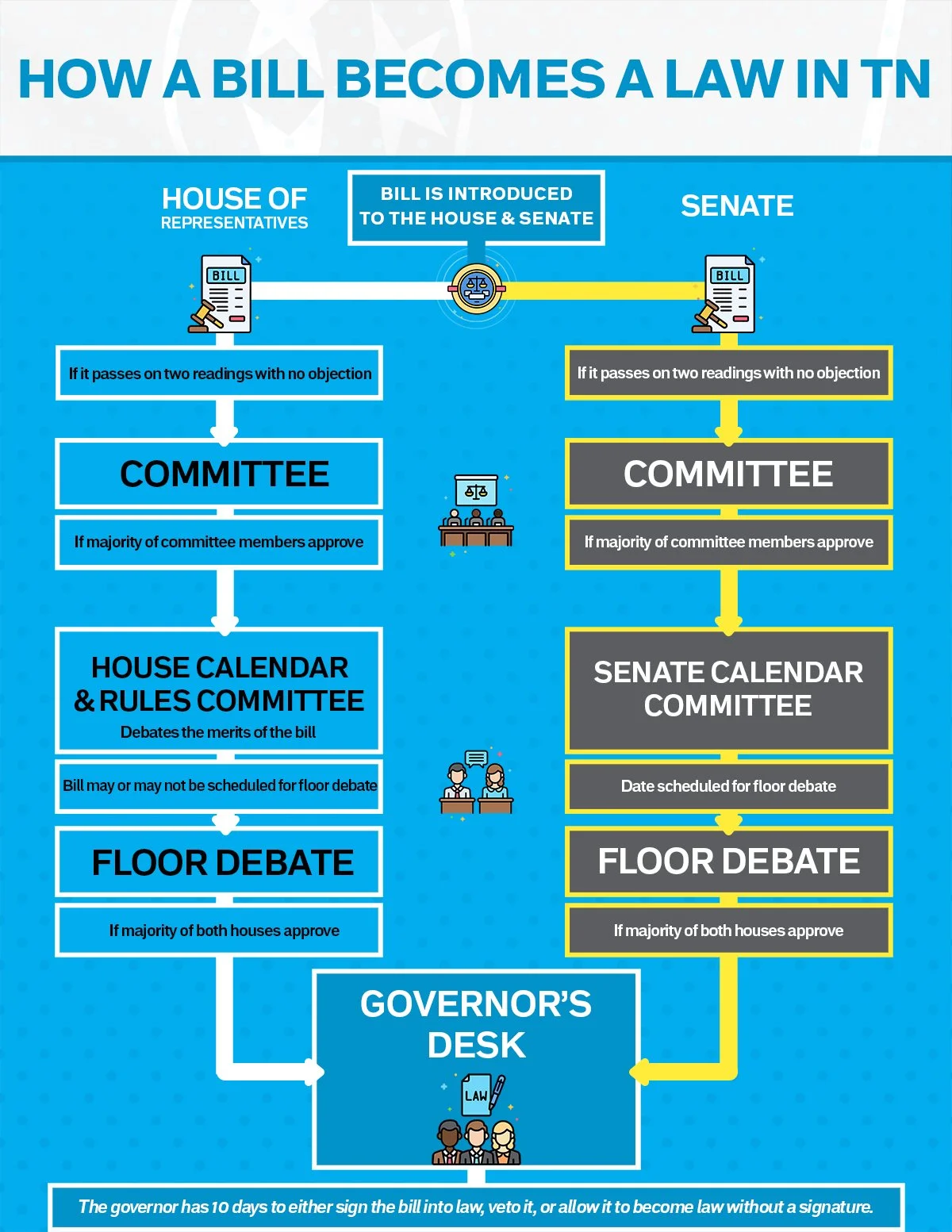TN General Assembly is now in session — how much do you know?
Remember electing state Senate and House reps back in November? The TN Legislature is now in session. Here's your overview of how things work in Nashville.
By William Newlin
Fast facts
Tennesseans elect a new General Assembly every two years, voting on all 99 House of Representatives members, who serve two-year terms, and half of the state’s 33 senators, who serve four years
The assembly meets for a total of 90 session days over those two years to pass new laws and modify existing ones
Use the “My Bills” feature on the General Assembly's website to track the status of the bills most important to you
Find your representatives and their contact information at capitol.tn.gov
Tuesday, Jan. 10, marked the beginning of the 113th General Assembly’s legislative session, which will likely run for about three or four months. After this two-week organizational session to approve assembly rules, elect leadership, and appoint the leaders and members of the House and Senate committees, the assembly will take a two-week break.
Over the next two years, legislators will meet for a total of 90 session days to pass new laws and modify old ones alongside Governor Bill Lee.
Here’s a quick overview of how the legislative process works and some of the potential new laws scheduled for debate this session.
Graphic by Ian-Alijah Bey
Tips for getting involved in the lawmaking process
“A lot of times legislators will tell you that they don't hear enough from constituents. Anecdotally, legislators in meetings I've heard say maybe three, five, 10 people have reached out on this bill … but oftentimes the legislators and their staff members are keeping a tally of people's messages, and emails, and things like that. So, if they have strong opinions, certainly reach out as early as possible. Strength in numbers is a key organizing strategy.”
— Chris Acuff, UTC Assistant Professor of Public Administration
How the TN General Assembly works
The Tennessee Senate, controlled by Republicans, is led by Lieutenant Governor and Speaker of the Senate Randy McNally. The state House of Representatives is also under Republican control, led by Speaker of the House Cameron Sexton.
Committees are the main way bills advance through the House and Senate to become laws. After a legislator first introduces a bill, and it passes two readings without objection, it goes to a committee — a group of lawmakers that oversee a specific area, like education or criminal justice — where it must get approval before a final vote. The House Calendar and Rules Committee is especially powerful, deciding whether any bill will be put on the House calendar for a full vote.
A majority of both the House and Senate must approve a bill, including any amendments added during debate, before the governor can sign it into law, veto it, or let it become law without a signature.
You can find all bills introduced in the House or Senate since 1995 here and find all state laws that went into effect since July 2013 here. Assembly sessions and committee meetings at the Tennessee State Capitol in Nashville are open to the public, and meeting videos are also available online. Find Senate videos from the current session here and House videos here.
- Trista Ridge contributed to this story.
A few bills to watch this session
Lawmakers began introducing new bills shortly after last November’s election. While it’s still uncertain which ones will make it to the House and Senate calendars and which will fail in the bill-to-law process over the next few months, here’s a look at some of the proposed legislation on the General Assembly’s docket. You can find a full list of the bills filed by the current assembly here.
Business
HB 21: Would create a fund for low-interest loans to “micro-businesses” employing five or fewer employees. It would also require the Economic and Community Development Department to target minority-owned and women-owned businesses and other businesses that have difficulty accessing credit.
Healthcare / Medical
HB 10: Would change language related to criminal abortion to say a licensed physician can legally perform an abortion to protect the physical or mental health of the mother. It would also legalize abortions in the cases of pregnancy resulting from rape or incest. Currently, abortion is illegal in Tennessee without exception, although those charged with criminal abortion can defend themselves by proving the abortion was necessary to prevent the death of the mother.
HB 1 and SB 1: Would make it illegal for health care providers to perform surgery or prescribe drugs that enable minors to assume a gender identity different from the gender associated with their birth sex. SB 1 passed on first consideration in the Senate on Jan. 10.
Entertainment
HB 9 and SB 3: Would criminalize “adult cabaret performances” on public property or in a location where a minor could see the performance. SB 3 passed on first consideration in the Senate on Jan. 10. To see the full definition of "adult cabaret performance," click on the summary tab here.
HB 30: Would require adult cabaret performers, including drag performers, to obtain a permit for their work from local adult-oriented establishment boards and would ban venues from allowing minors to attend “adult cabaret performances.”
SB 7: Would delete language in an existing law that allows open containers of alcohol in Chattanooga’s Station Street Entertainment District next to the Choo Choo. SB 7 passed on first consideration in the Senate on Jan. 10.
Education funding
HB 27 and SB 74: Would allow students with a HOPE scholarship to continue to use scholarship funds for an advanced degree if they finish their undergraduate degree faster than expected. SB 74 passed on first consideration in the Senate on Jan. 10.
Guns
HB 41: Would make it legal for school superintendents to select employees who could carry a concealed firearm on school property. Currently, only superintendents in “distressed rural counties” can do this — in all other schools, only current or former law enforcement officers can carry a weapon on school grounds.
HB 37: Would add several types of weapons and ammunition to the “Tennessee Firearms Freedom Act,” which says that firearms and ammo made in Tennessee are not subject to federal oversight. Those additions include: a firearm that requires more than one person to use, ammo that explodes after firing, and a firearm that shoots more than one projectile at a time.
Government employees and officials
HB 48 and SB 87: Would cap the number of elected members of a municipal government to 20. It would affect the Nashville Metropolitan Council, which has 40 members, but it wouldn’t impact the Chattanooga City Council’s nine members. SB 87 passed on first consideration in the Senate on Jan. 10.
SB 16: Would create additional leave for state employees with at least 12 months of service, including 12 weeks of dedicated maternity and paternity leave and one week of medical leave for serious health conditions. SB 16 passed on first consideration in the Senate on Jan. 10.



